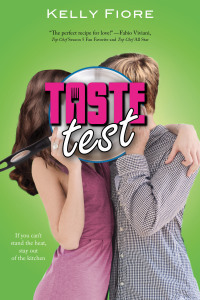The Difference Between Self-Publishing and Traditional Publishing
24 Days until TASTE TEST meets the world!
What is the difference between these two books?
Let’s go through the obvious — on the left is Gretchen Powell’s book, TERRA. It is a dystopian YA novel.
On the right is my book, TASTE TEST. It’s a contemporary YA novel.
Gretchen is a friend of mine — by all accounts, she’s an incredible writer. She has great reviews on GoodReads. She has a terrific blog and a loyal following. That — and she’s super-cool and nice and sweet.
There is no visible difference between these two books — the only difference is how they were published.
Self-publishing has really come a long way since it’s inception. It used to be considered “vanity publishing” — a method to get your work published because you weren’t able or willing to go through the traditional channels.
Now, though, self-publishing is just another option. It’s just another way to get your book out into the world.
Gretchen, for example, is incredibly talented and knows talented people. She had the savvy to create the book, the cover, the company that the book is published under, etc. She worked her ASS off to do that.
I do NOT have those talents.
I can write — but I wouldn’t even know where to begin if I had to publish my own work. There are great websites that walk you through it, there are dozens (hundreds?) of designers to help you with covers and all that goes into the process.
The biggest difference between self-pubbing and traditional?
There are two: 1. The people in your corner and 2. Time.
1. The people in your corner
When you publish through traditional channels – i.e. a major publisher, or a small press — you have people working for your success. You don’t have to pay for their support. You don’t have to pay for anything — unless you choose to, obviously. You will have a publicist sending your book to all the major reviewers — PW, Kirkus, NYT, etc. You will have an editor and copy editors going over your manuscript and polishing it up. You will have support from retail locations — many of whom may stock your book.
It still remains true that you are many times more likely to be stocked in stores in the shelves if you are published traditionally. The stigma that self-publishing = vanity is certainly still there, but it’s also mostly to do with the real estate of books. There isn’t even close to enough shelf space for all the books that come out into the world.
If you self-publish, you should expect that your book will not show up at BaM or Barnes & Noble or (and especially) WalMart or Target. You might get local stores and small Indie book stores to carry your work — but, again, you’re fighting for the same spots as mainstream books from traditional publishers.
And 2?
Time.
Publishing is SLOW. By all accounts. It’s no one’s fault. It’s not problematic. It’s just a slow industry. TASTE TEST took 25 months to make it from purchase to print. That is very normal. The best case scenario — unless you’re a celebrity — is 18 months.
So if you’re impatient or you have a specific reason you want your book out RIGHT NOW — you want to publish before a family member passes away or you want to capitalize on a trend or whatever — than self-publishing is for you.
Similarly, if you’ve tried the traditional route and it isn’t your thing or you didn’t find the success or reception you are looking for — self-publishing could be the way to go.
There are a handful — probably more than that, probably a few dozen or so — of self-published authors who become best sellers. It does happen — and then two things usually occur. First, they have an amazing platform and marketing plan. They’re willing to put the time and money into it. They’re committed to forging their own success in this critical world. And, second — once they’re a best seller? Most of the time, they sign with a big named publisher.
There’s no shame in that game — seriously. You do you.
In the end, the difference between the two routes have nothing, NOTHING to do with talent and everything to do with choice. It’s choosing which journey you want to be yours. In my case, I wouldn’t change a thing. I wrote a YA novel in November of 2008 and, 4.5 years later, I’m a full-time novelist. My journey was MAGICAL. But there was certainly a lot of waiting. I learned a lot about being patient. And that’s just part of it.





